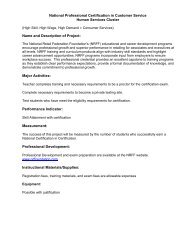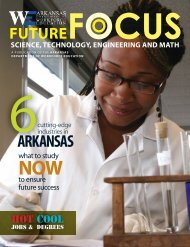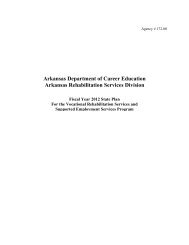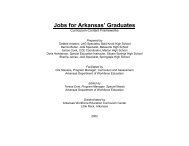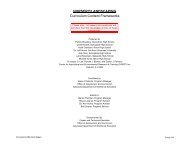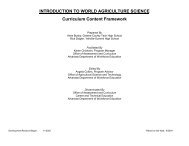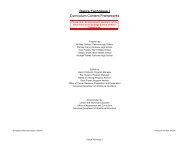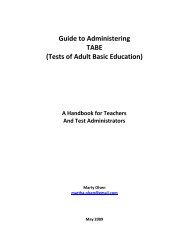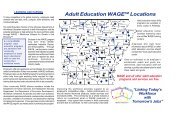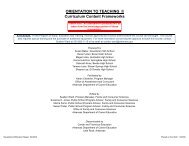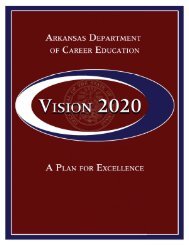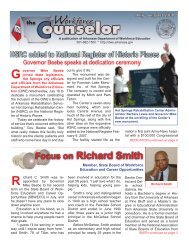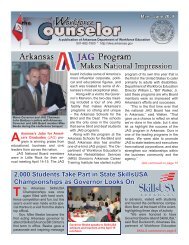Feb-Mar08counselor - Arkansas Department of Career Education ...
Feb-Mar08counselor - Arkansas Department of Career Education ...
Feb-Mar08counselor - Arkansas Department of Career Education ...
You also want an ePaper? Increase the reach of your titles
YUMPU automatically turns print PDFs into web optimized ePapers that Google loves.
page 9<br />
PATHWAYS continued from page 1<br />
high-tech, high-wage, highdemand<br />
fields <strong>of</strong> the 21 st century<br />
lie inside <strong>Arkansas</strong>’s career and<br />
technical education programs<br />
and its two-year colleges.<br />
“When I look into the eyes <strong>of</strong><br />
career and technical education<br />
educators, and when I look into<br />
the eyes <strong>of</strong> your students who are<br />
the future, it’s exciting,” Walker<br />
said. “To think <strong>of</strong> the challenging<br />
jobs they’ll have and the qualified<br />
workforce you’re producing – you<br />
are the ones who are making a<br />
difference. You will help them find<br />
their niche. You will help prepare<br />
them for high-paying jobs.”<br />
Much <strong>of</strong> the concern for the<br />
future was based on the Ed Gordon book The 2010<br />
Meltdown. The book describes the immediate need<br />
for a large, highly skilled workforce amidst the rapid<br />
retirement <strong>of</strong> the baby boom generation.<br />
Dr. Angela Brenton, co-chair <strong>of</strong> The 2010<br />
Meltdown study group at the University <strong>of</strong> <strong>Arkansas</strong><br />
at Little Rock, says the publication attracted some<br />
much-warranted attention at the university.<br />
“There’s a perfect storm bringing a massive labor<br />
shortage in the next 10 to 15 years,” Brenton said.<br />
“By the year 2050, the US will lose 22 to 58 percent<br />
<strong>of</strong> its workforce to retirement.”<br />
According to Brenton, the United States needs to<br />
experience a cultural shift in order to cope with the<br />
impending labor shortfall. She says 42 percent <strong>of</strong><br />
today’s fastest growing jobs don’t require four-year<br />
degrees and that 70 percent <strong>of</strong> high school graduates<br />
go on to four-year colleges, but only 27 percent <strong>of</strong><br />
those students graduate from the four-year schools.<br />
“We’ve developed a culture in the United States<br />
where parents want there kids to go to a four-year<br />
college,” Brenton said. “We may not be doing a good<br />
job <strong>of</strong> counseling some students toward career and<br />
technical education where they can be more<br />
successful. Students involved in career and technical<br />
education tend to develop more <strong>of</strong> an interest in<br />
education on the whole.<br />
“Business and industry holds a vested interest in<br />
solving the labor shortage,” she added. “We need to<br />
pool resources and work together to meet the<br />
DWE Associate Director for <strong>Career</strong> &<br />
Technical <strong>Education</strong> Rod Duckworth<br />
speaks to the assembled crowd<br />
challenges that face the<br />
economy.”<br />
Collaboration is at the heart<br />
<strong>of</strong> Governor Mike Beebe’s<br />
Workforce Cabinet, which is<br />
made up <strong>of</strong> the <strong>Department</strong> <strong>of</strong><br />
Workforce <strong>Education</strong>,<br />
<strong>Department</strong> <strong>of</strong> Workforce<br />
Services, <strong>Arkansas</strong> Workforce<br />
Investment Board, <strong>Department</strong><br />
<strong>of</strong> <strong>Education</strong>, <strong>Department</strong> <strong>of</strong><br />
Higher <strong>Education</strong>, <strong>Arkansas</strong><br />
Science and Technology<br />
Authority, <strong>Arkansas</strong> Economic<br />
Development Commission and<br />
the Association <strong>of</strong> Two Year<br />
Colleges.<br />
“Governor Mike Beebe has<br />
said we can no longer be satisfied with business as<br />
usual, we must be innovative and we must challenge<br />
the status quo,” said Director Walker to conference<br />
participants. “He has said until we do this, we will not<br />
be able find the solutions that work best for our<br />
working families and our business community. It will<br />
require a change in philosophy, and that must begin<br />
at the very core <strong>of</strong> our efforts. This governor has<br />
made a commitment to business and education and<br />
the Workforce Cabinet agency directors have formed<br />
a partnership to provide advice and direction.”<br />
Director Walker re-iterated the Governor’s<br />
commitment at the conference, while attendees heard<br />
from Workforce Cabinet directors and and their plans<br />
to implement his vision.<br />
<strong>Arkansas</strong> <strong>Department</strong> <strong>of</strong> Economic Development<br />
Deputy Director Ron Zook said that career and<br />
technical education is important to the state’s<br />
economic development and is paramount to the<br />
recruitment <strong>of</strong> industry.<br />
“In <strong>Arkansas</strong> there are seven agencies working<br />
together to prepare students for the global economy,”<br />
said Zook. “On a given day in our state there are<br />
70,000 people who are unemployed and there are<br />
70,000 openings in the manufacturing industry. The<br />
disconnect is in the skills <strong>of</strong> the workers. The solution<br />
to closing the disconnect is in the instructors.”<br />
Meanwhile, <strong>Department</strong> <strong>of</strong> <strong>Education</strong><br />
commissioner Dr. Ken James said education on the<br />
PATHWAYS continued on page 10



